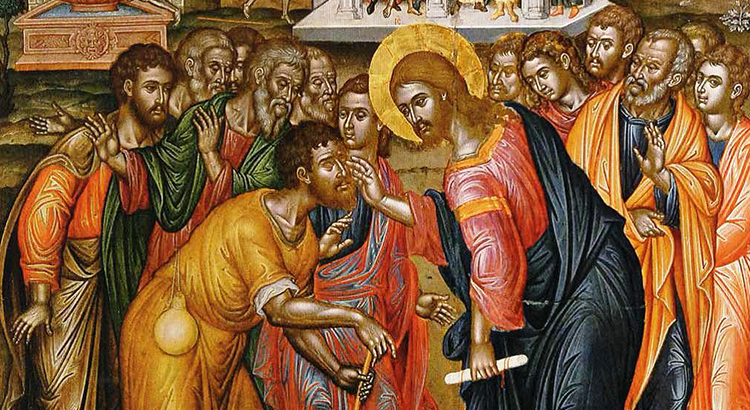Prayer for the sick
The prayer for the sick is held in the Basilica of Santa Maria in Trastevere.
Memorial of Saint Boniface (+754), bishop and martyr. He announced the Gospel in Germany and was killed in a missionary journey in Frisia.
Reading of the Word of God
Alleluia, alleluia, alleluia
This is the Gospel of the poor,
liberation for the imprisoned,
sight for the blind,
freedom for the oppressed.
Alleluia, alleluia, alleluia
Tobit 1,3; 2,1-8
I, Tobit, have walked in paths of truth and in good works all the days of my life. I have given much in alms to my brothers and fellow country-folk, exiled like me to Nineveh in the country of Assyria. In the reign of Esarhaddon, therefore, I returned home, and my wife Anna was restored to me with my son Tobias. At our feast of Pentecost (the feast of Weeks) there was a good dinner. I took my place for the meal; the table was brought to me and various dishes were brought. I then said to my son Tobias, 'Go, my child, and seek out some poor, loyal-hearted man among our brothers exiled in Nineveh, and bring him to share my meal. I will wait until you come back, my child.' So Tobias went out to look for some poor man among our brothers, but he came back again and said, 'Father!' I replied, 'What is it, my child?' He went on, 'Father, one of our nation has just been murdered; he has been strangled and then thrown down in the market place; he is there still.' I sprang up at once, left my meal untouched, took the man from the market place and laid him in one of my rooms, waiting until sunset to bury him. I came in again and washed myself and ate my bread in sorrow, remembering the words of the prophet Amos concerning Bethel: I shall turn your festivals into mourning and all your singing into lamentation. And I wept. When the sun was down, I went and dug a grave and buried him. My neighbours laughed and said, 'See! He is not afraid any more.' (You must remember that a price had been set on my head earlier for this very thing.) 'Once before he had to flee, yet here he is, beginning to bury the dead again.'
Alleluia, alleluia, alleluia
The Son of Man came to serve,
whoever wants to be great
should become servant of all.
Alleluia, alleluia, alleluia
Tobit lives far from his land, in the city that is enemy par excellence, Nineveh. But despite being in the diaspora Tobit continues to be faithful to the Law of God, while the majority of the people of Israel lived a religious apostasy practising idolatrous cults contrary to the only cult, that of the temple in Jerusalem. Tobi remained rooted in the faith of his fathers, in which he had been educated by his grandmother Deborah (this memory of his grandmother in the transmission of the faith is significant) and faithful to Jerusalem: "...I was mindful of God with all my heart" (1:12). His memory runs back to the years of his life in his homeland. And he confesses his faithfulness to the Lord: "I, Tobit, walked in the ways of truth and righteousness all the days of my life." Following the great patriarchs, he had chosen a wife from his own kinship. At the forefront of Tobit's life is the law of the Lord, from which three priorities emerge, which we will find again in the course of the book: charity towards fellow countrymen, worship (emphasised by the importance of Jerusalem and the temple) and family values. He gives his son the name Tobias, meaning "the Lord is my good," even if his current condition seems to show otherwise. But this is precisely the teaching that rises from these pages: he who is faithful to the Lord will be accompanied in his days by the angel of God and will receive his reward. The episode narrated (2:1-8) relates the story that happened on the feast of Pentecost when Tobit invited Tobias to invite a poor man to the meal prepared. A very beautiful tradition. But the sequel tells of the violent death of a Jew left unburied in the square. And Tobit gets up from the table, leaves the meal and goes to the square to take care of the dead man until he is buried. Everyone mocks him. But this man's pity becomes exemplary in overcoming the violence and neglect that make every society cruel, then and now.
